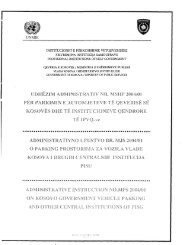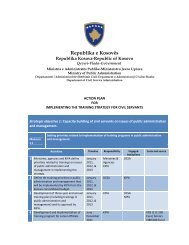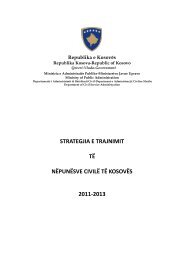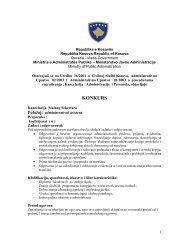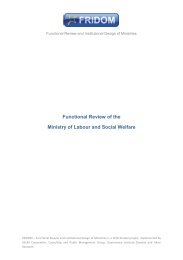Download
Download
Download
You also want an ePaper? Increase the reach of your titles
YUMPU automatically turns print PDFs into web optimized ePapers that Google loves.
One option for the organisation of a Department of Secondary and Tertiary Services has been set<br />
out below. It is only one of many possible options and needs to be discussed and tested with the<br />
MOH. The primary health, public health and mental health services are dealt with later in this report.<br />
Policy & planning unit<br />
(also support to<br />
funding/purchasing<br />
function)<br />
Detailed policy and planning related to secondary and tertiary services could be carried out by this<br />
Department. Note that the policy and planning role in the Department of Strategic Management is a<br />
facilitation role that helps departments like this one feed into ministry-wide policy, planning and<br />
budgeting processes. The services provided by the Office for Treatment Abroad could be included in<br />
the Policy and Planning Unit or the HCCA.<br />
The monitoring role would include monitoring hospitals. This would involve routine monitoring of the<br />
performance reports, as distinct from the inspection functions if the Health Inspectorate. The idea of<br />
having monitoring units requires more work to assess whether there is sufficient capability able to be<br />
attracted the individual units or whether fewer units are more realistic, although note that the skills to<br />
do policy analysis are similar to the skills used in routine monitoring.<br />
Options agencies<br />
Department of secondary and<br />
tertiary services<br />
Staff members in the MOH and hospitals have commented that the current arrangements of the<br />
MOH having detailed decision making roles with regard to the agencies including the hospitals is not<br />
an efficient and effective way to deliver services. The problems noted above in relation to budgets<br />
are examples of the issues affecting performance. The creation of a robust governance and<br />
accountability framework for the agencies including the hospitals could include the following:<br />
A suitable legal framework that covers all essential components of an agency law, tailored to<br />
the situation in Kosovo. While the Health Law 2004 has many useful provisions it does not<br />
provide a full accountability framework for an agency. If an agency law is not likely any time<br />
soon then amend the Health Law. Chapter VIII of this law could be expanded. Appendix G<br />
has some suggested draft provisions.<br />
Governance arrangements with a separation of governance and management roles, boards<br />
with members with governance skills, good governance practices in the part of the board<br />
including management of conflicts of interest. The Health Law provides for a supervisory<br />
board but hospitals do not tend to have these boards. The suggested provisions for<br />
revisions to the Health Law in Appendix G include the application of the provisions about the<br />
board of directors from the Public Enterprise Law with some modification. That law has many<br />
provisions designed to minimise conflicts of interest and to ensure that the boards can be set<br />
up well to carry out their functions.<br />
Clarity of roles and responsibilities between governance boards, management, MOH<br />
officials, and others. The Health Law 2004 could be expanded to do this as suggested in<br />
Appendix G.<br />
Good ex ante accountability document covering forecast finances and forecast service<br />
performance. The Health Law has high level requirements for the Annual Plan but there are<br />
23<br />
Monitoring unit



